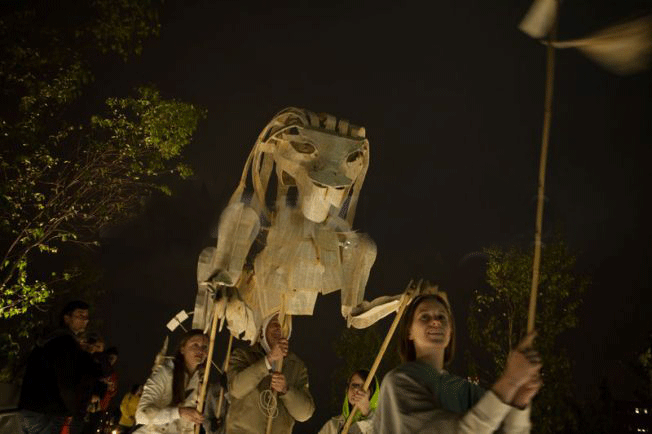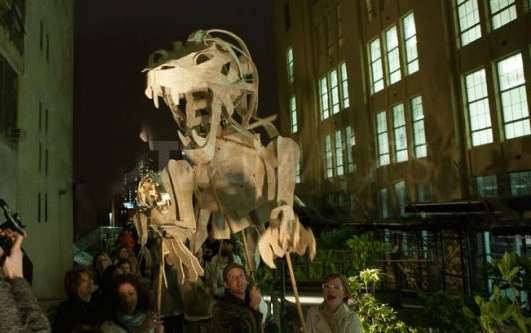 .
.
PHOTOS: Ed Lefkowitz
FIND YOUR EX LIBRIS TEXT BELOW. All texts are by featured PEN Festival authors:
Ib Michael, The Pope of the Indies, translated by Ingrid G. Lansford.
“He can’t tell how long the corpse has been in the straw, but the skin appears thin and parchment-like. In some places there’s lividity. The watchman throws a glance over his shoulder, senses another presence, but that’s always the case when someone has recently passed to the other side. The watchman crosses himself, stoops down and closes the eyes, which are staring up toward the hole to the night sky.He doesn’t see the rivers, the shining cities, the mountains, and the jungles under the domed forehead...”
From Oryx and Crake by Margaret Atwood. © 2003 by O.W. Toad Ltd. Originally published in the United States by Random House/ Nan A. Talese.
“What is toast?” says Snowman to himself, once they’ve run off. Toast is when you take a slice of bread – What is bread? Bread is when you take some flour – What is flour? We’ll skip that part, it’s too complicated. Bread is something you can eat, made from a ground-up plant and shaped like a stone. You cook it… Please, why do you cook it? Why don’t you just eat the plant? Never mind that part – Pay attention. You cook it, and then you cut it into slices, and you put a slice into a toaster, which is a metal box that heats up with electricity – What is electricity? Don’t worry about that. While the slice is in the toaster, you get out the butter – butter is a yellow grease made from the mammary glands of – skip the butter. So, the toaster turns the the slice of bread black on both sides with smoke coming out, and then this “toaster” shoots the slice up into the air, and it falls on the floor…
“Forget It,” says Snowman. “Let’s try again.” Toast was a pointless invention from the Dark Ages. Toast was an implement of torture that caused all those subjected to it to regurgitate in verbal form the sins and crimes of past lives. Toast was a ritual item devoured by fetishists in the belief that it would enhance their kinetic and sexual powers. Toast cannot be explained by any rational means.
Toast is me.
I am toast.
Nadia Kalman, The Cosmopolitans
We skip past the next two years like cats skipping roof to roof. False elections, massacres, poison letters: what is the point of immigration if we are doomed to the same conversations we had in Old Eastern Europe? Haven’t we all had enough of history, of the pathetic surprise on everyone’s face? (Yes, Petya, it’s really you they’re going to kill, you’ve exhausted your allotment of Peace.) I treat history like my grandmother told me to treat dogs, wolves, inspectors, anti-Semites and bees: I don’t bother it, it doesn’t bother me. You would be happier if you did the same.
Ruta Sepetys, Between Shades of Gray
They took me in my nightgown.Thinking back, the signs were there—family photos burned in the fireplace, Mother sewing her best silver and jewelry into the lining of her coat late at night, and Papa not returning from work. Only later did I realize that Mother and Father intended we escape. We did not escape
. We were taken.
Etgar Keret, Asthma Attack
When you have an asthma attack, you can't breathe. When you can't breathe, you can hardly talk. To make a sentence all you get is the air in your lungs. Which isn't much. Three to six words, if that. You learn the value of words. You rummage through the jumble in your head. Choose the crucial ones - those cost you too. Let healthy people toss out whatever comes to mind, the way you throw out the garbage. When an asthmatic says 'I love you,' and when an asthmatic says 'I love you madly,' there's a difference. The difference of a word. A word's a lot. It could be stop, or inhaler. It could even be ambulance.
Valerie Mejer, Let’s Say
Let’s say that the eye is a country,
and that the ear,
and the mouth and the skin are a country.
So being, who lives in them,
who rots them out?
The liquid tenants of paradise
aren’t coming back.
Cain slaughtered Abel, countries clotted with people.
Since then, we’ve palmed
and bitten a soft fruit
salty as blood.
I trace the trajectory of detached continents.
Lila Azam Zanganeh, The Enchanter: Nabokov & Happiness (Norton)
One cobalt-blue morning of butterfly hunting, in August 1971, after climbing a Swiss mountain, looking tanned and serene, net in hand, Vladimir Nabokov told his son Dmitri he had fulfilled all he ever dreamed, and was a supremely happy man. It is on this mountainous peak that I like to imagine him, VN, exclaiming like his elated creature Van Veen: “I, Vladimir Nabokov, salute you, life!”
Maud Casey, The Man Who Walked Away
When Albert walks, he annihilates distance like a bicycle. Albert has no use for wheels but covers as much distance. In Mont-de-Marsan there is a poster above the bar in a public house—a soldier and, trailing behind him, a corps of infantrymen on bicycles waiting to be led into battle. Cyclists are called les marcheurs qui roules. Un marcheur qui roule tout seul, Albert doesn’t need a war; when he walks he is a hero who has performed deeds of improbable greatness and though he can’t remember what they are, they are surely magnificent. When Albert walks, he is the new steam engine, powering himself like a great ship. He is the telegraph; he is the phonograph; he cuts a swath through the end of the century full of invention and endless possibility. Still faster, he moves faster, faster than time.
Anka Muhlstein, Balzac’s Omelette
Balzac celebrated sending a manuscript off to his editor by speeding to a restaurant. There he downed a hundred oysters as a starter, washing them down with four bottles of Vouvray white wine, one of the most intoxicating known to man which only served to add a sparkle to his gaiety; he then ordered the rest of the meal: twelve salt meadow lamb cutlets with no sauce, a duckling with turnips, a brace of roast partridge, a Normandy sole not to mention extravagances like dessert and special fruit such as Comice pears, which he ate by the dozen.
Patrick Boltshauser, Tomorrow it`s Deggendorf
Your brother has tied on a barbecue apron, THE BOSS IS COOKING, and fusses around masterfully with his tongs. “How do you want your meat?” he asks, as if he hadn`t known for years that you don`t eat any. “Alive!” is your answer, as always.
Robert Gal, Aphorisms
Knowledge – a narrow, twisting hallway, lit by a fuse.
Victoria Redel, Woman Without Umbrella
The man sitting on one side of me is reading Jean Genet and the woman on the
other
is reading the NY Post with the headline: Attack of the Killer Tomato. Across from me
the row of ankles are all crossed. Because a father says to his son, Because I said so
is why.
The doors shut then stutter open and five kids gangle in speaking Chinese
Susan Bernofsky
It all began as an exercise in listening. We came to occupy words. Then it was a revolution. Barricades popped up, and it turned out we were speaking a different language. We crossed back, crossed forth, crossed over. No one knew how to speak. The words didn’t mean what they were supposed to, or else the listening was broken. Listening breaks easily, it’s as delicate as honeycomb. The words flutter, meanings fluctuate. A man clutching a can of pepper spray is a first responder. A public park must be kept clean.
Deborah Eisenberg, Recalculating
It would be just twilight at home. Their dignified, ethereal Nell would be comforting her pet mouse while the thunder and lightening raged above her. Almost instantly she’d receive a photo of what was just about to be the world’s very latest moment—by then so long elapsed.
“Okay,” Fumiko said. “Don’t move.”
Riikka Pulkkinen, TRUE
It happens anew all the time. There’s always some who are young and convince themselves that this has never happened to anyone before them. They believe that their lives, their own joys and sorrows, are extraordinary. That their own love is stronger than other people’s. They believe it will never be their lot to feel the days weighing on them. And they may be right. The young have the whole world, and they toss it away without a thought because they’re impatient for other, ever newer worlds.
He would have liked to say to Anna: Make a home for yourself in your carefree days. They’re dreams, but you don’t have to wake up yet. Ten years and you’ll start to wake up, five more and you’ll struggle against the awakening, ten more years and you’ll be content with what you have. It’s not a bad thing, far from a misfortune. In fact it’s a new form of happiness, and you’ll cherish it like all your other happy feelings. More and more you’ll have moments when you feel the world is offering itself to you like a gift. But it won’t be the same. You’ll look at the world like a painting, and time will have framed it, the experience of time, and you’ll enjoy it in a different way than you did before.